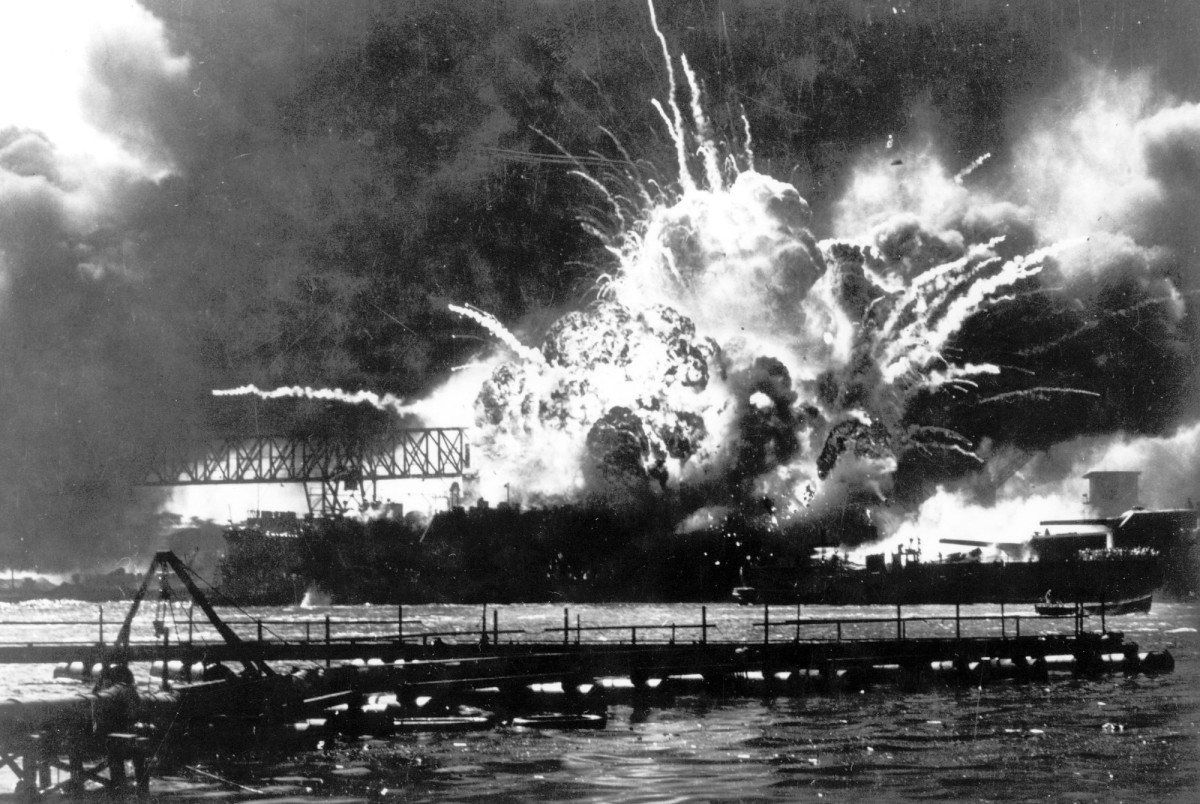Veterans who witnessed the Japanese attack on Pearl Harbor are just about gone, and it is their children who remain to tell the stories, sometimes from sketchy memories of the moment the bombs started dropping.
These kids are getting on in years themselves. At the time of the attack 74 years ago today their parents were mostly the young sailors stationed on ships in the harbor or out on maneuvers at sea. One of these kids was Bob Wakefield, 80, of Santo Domingo in The Villages.
“I was 6 years old, a typical kid who loved to be outside kicking a soccer ball,” Wakefield said. He was doing just that, kicking a soccer ball in front of his Honolulu house, about 8:15 a.m. Sunday, Dec. 7, 1941, when his mom and little sister “came running out of the house. Mom said she’d heard on the radio that the Japanese had bombed the harbor.
“I ran with them to a spot where we could look down toward the harbor, about six miles away, and columns of black smoke were rising,” he said.
That’s all he remembers now of the traumatic event. What he saw was the sinking of ships including the battleship Arizona, which was hit by an armor-piercing bomb at 8:10 a.m., blew up, broke in two and in nine minutes went to the bottom, killing 1,177 men.
Wakefield’s father, a Navy lieutenant junior grade, was serving on a destroyer escort that happened to be at sea, on maneuvers. So, luckily, he escaped the onslaught in the harbor.
“By the time the war ended, dad was a captain, a temporary grade,” Wakefield said. “But the fact of all those quick promotions gives you a sense of how quickly these young sailors faced responsibility far beyond what they’d experienced before the war.
“Dad was commanding the USS Astoria, a light cruiser, in 1942 when it was sunk in the Battle of Savo Island,” Wakefield said. “The battle took place Aug.8 and 9. It was the first naval engagement of the Guadalcanal campaign. Five U.S. ships were lost. I’m told it was the worst defeat in the history of the U.S. Navy. Yet, again, dad was lucky and survived.”
He recalled seeing almost nothing of his father until the war was over. Little or no time with dad was a fact of life for children in 1941-45.
Within two days of the bombing of Pearl Harbor, Wakefield and his mother and sister, three years younger, were on a ship with a lot of other American families, bound for the U.S.
“We left in a big rush,” he said. ” We took some clothing, but left everything else behind—furniture, bedding, kitchen utensils, toys.…Was I scared? Yes, I was. I was just a kid, and I didn’t really understand what was happening to us.”
Lots of children were among the passengers on the ship bringing Wakefield stateside, many marked by the trauma of what they had seen and heard that makes them cry even now at ceremonies involving the posting or raising of the American flag.
Wakefield grew up stateside and went to Lehigh University in Bethlehem, Pa. He married Barb Flynn, his college sweetheart, whom he first met at a dance at her school, Moravian College, also in Bethlehem.
He joined the U.S. Geological Survey as a cartographer right out of college, making topographic maps for the government. He traveled “all over the east coast area” for 39 years. He pursued hobbies such as flying and joined the Coast Guard Auxiliary and received training in seamanship.
An outdoor enthusiast, Wakefield was a Scoutmaster and eventually joined Big Brothers to help young boys even more because, “while Scouting offered bonding opportunities it didn’t afford one-on-one relationships. Many kids I led in Scouting didn’t have a father at home. They were needy kids.”
He has photographs in several scrapbooks of boys he helped.
“Some of the boys write and visit to this day,” he said. “I shouldn’t says boys — some of them are 40 years old, even older. I often get notes, and the boys, young men now, visit from time to time. I’m lucky to have been able to help them grow up when they had no dad to be with.”
Big Brothers mentor fatherless boys until they are 18 years old.
Wakefield has a framed note from one of his charges from May 1999 that says, “I’ve had many encouraging people in my life but one person stands out in front of all of them. His name is Bob. Bob has helped me through all the troubles in my life…Bob has been and still is a very good friend and an encouraging BIG BROTHER!!!”
A friend of Bob’s, visiting for the holidays, worked with him for many years in the Big Brothers organization on the East Coast and recalled a visit to the White House on the day of the lighting of the executive mansion’s Christmas tree that included an encounter with President Ronald Reagan.
Bob called out, “Merry Christmas, Mr. President,” and Reagan reciprocated.
More recently Wakefield has found his enjoyment in activities in and around The Villages, including driving a cab. His myriad recreational interests have included the Barbershop Harmony Chorus, Sertoma Club, Lighthouse Group, Hangar Flyers Club, Music Boosters, Civil War Study Group, WWII History Club, Deep Sea Fishing Club and others.


